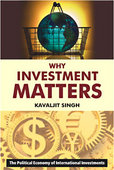Ressources
 NEW Book : ’Why Investment Matters : The Political Economy of International Investments’
NEW Book : ’Why Investment Matters : The Political Economy of International Investments’
by Kavaljit Singh
available for download at
http://www.thecornerhouse.org.uk/su...
What is investment ? The website of the World Bank, the world’s largest international development lender, defines it as :
’Money spent now in order to make the economy grow and have more money — or goods and services — later.’
But in fact investment is much more than an apolitical process of mysteriously making money ’grow’. It is about using money so that it defines who gets access to what is bought with that money ; it defines what is done with what gets bought. It determines who accumulates wealth at whose expense — and who benefits as a result.
Investment thus has profound implications for public services, determining not only whether schools, hospitals and water supply services get built, but also who gets schooled, who gets medical care, and who gets to enjoy piped water.
When money flows in and out of countries at the stroke of a computer keyboard, people who have never heard of bonds or derivatives, stocks or shares investors are profoundly affected. The traders are probably unaware of the consequences of their actions on the lives and livelihoods of shanty-dwellers, aspirant middle class householders or workers on the other side of the globe, on environments destroyed, factories lost, savings wiped out or prospects shattered.
If the buying and selling of assets for profit is not to undermine the public good, the public has to define that good. The public has to frame the policies and laws that will hold investors to account when their actions undermine the public good. In sum, the struggle is to democratize investment.
Over the last two decades, however, many of the mechanisms developed to assert the public’s right to ensure that the wealth generated by citizens benefits the collective good have been dismantled. Under the direction of the International Monetary Fund, ’free market’ policies imposed across the globe have de regulated controls on investment and re-regulated markets (and subsidies) for the benfit of private, for-profit investors. In the process, decision-making has increasingly moved from public scrutiny and accountability.
To influence the investment process, the public needs to know how investment works, who are the main players and major trends. In this 178-page book, economist Kavljit Singh explains the central role that transnational corporations have in investment. He sets out in clear and accessible language how investment patterns have changed in the past 20 or so years.
He debunks some of the myths surrounding investment flows. Foreign direct investment (FDI), for instance, is not an automatic route to economic growth. In fact, it can lead to an outflow of capital rather than an inflow.
In the Democratic Republic of Congo, Mali and Nigeria, profit remittances going out of the country are higher than FDI inflows. The South has in fact become a net exporter of capital to the North, particularly to the United States, a country that now relies on China and other developing countries to finance its huge deficits. The book outlines the growing backlash against foreign investments in many Latin American countries, Russia, Thailand, Korea and India.
With clear examples and ample data, Kavaljit maps out investment flows, trends and regulatory frameworks — and ways in which investors evade regulation. The rise of private equity funds is one example.
He suggests ways in which the vast sums of money sloshing around the global financial system can be brought back under the democractic control of citizens and governments.
We hope this book will help to increase the effectiveness of such collective action by informing citizens and movements and their allies in government and the financial community of key issues and by identifying areas where policies and practices can and should be changed.
Listen to a podcast interview with the author, Kavaljit Singh : http://www.fern.org/media/documents/document_3927_3931.mp3


